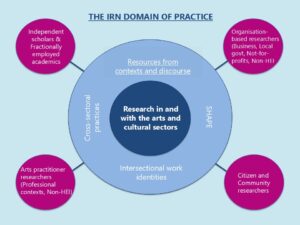
Independent researchers play an essential role in shaping our cultural and academic landscape. They are the artists, writers, academics, community organisers, and citizen researchers who, outside of formal institutional structures, carry forward inquiries that enhance research and enrich society. Yet too often, their work is invisible and disconnected from the infrastructures that make research sustainable and support personal and professional development.
This is why NCACE is developing the Independent Researchers Network (IRN) - a new initiative designed to provide recognition, visibility, and vital support for this diverse and growing community of researchers. We are delighted to have appointed Independent Researcher and Artist Funmi Adewole-Elliott as an NCACE Fellow to work with us on the leadership and development of the network and the associated research and publications. Funmi brings a wealth of experience from across academia and the arts to the Fellowship role, as well as a deep understanding of the challenges of working as an independent across both sectors, we are excited to welcome her on board!
Why now?
The landscape for researchers and practitioners in the arts, humanities, cultural and community focused sectors has shifted dramatically in recent years. Where freelance work was once largely the preserve of artists, we now see academics researchers too increasingly working independently, often combining fractional university roles with self-employed practice. At the same time, cuts in public funding, increasing instability in the university sector and the ongoing precarity of the creative and cultural industries have made cross-sector collaboration not simply desirable, but essential.
Independent researchers are often the ones most able to bridge sectors - working at the intersections of academia, the arts, cultural industries, local government, and communities. But doing so without access to institutional resources or peer networks can be daunting. The IRN aims to provide a framework of support that will help independent researchers to flourish, connect, and have greater impact.
Listening to the community
In designing the IRN, we knew it was vital to start with the voices of independent researchers themselves. A consultation event in June brought together a wide spectrum of practitioners - academic scholars, cultural workers, visual artists, and community-based researchers. The discussions highlighted the diversity of positions independent researchers occupy but also revealed strikingly common needs.
Academics working outside formal contracts told us of the difficulties in accessing ethics approval, conferences, or peer review. Artists spoke of challenges in having their research recognised and cited, with their names too often detached from the knowledge they produce. Community practitioners noted the barriers they face in gaining visibility for research embedded in social action.
What united all participants was a desire for a space to articulate their research practices, connect with peers across sectors, and develop language and frameworks that recognise and reflect the breadth of what independent research can be.
Filling the gaps
Alongside these consultations, we also mapped the landscape of existing networks. While there are well-developed structures for academic researchers, and increasing recognition of citizen and community research, a clear gap remains: independent artists and cross-sector researchers lack a professional discourse, and with it, the frameworks that enable their work to be understood, recognised and therefore supported.
Drawing on NCACE’s networks and unique positionality, IRN is well placed to address this gap. Unlike other networks, its purpose is explicitly cross-sectoral, fostering dialogue between academics, artists, and community researchers. It will create opportunities for independent researchers to share and strengthen their practices, while also connecting them to wider conversations around research culture led by other organisations working in the space such as UKRI and the British Academy.
What the IRN will do
The IRN’s programme of work will unfold over the next four years, with key strands including:
- Network meetings bringing together independent researchers from across the UK to exchange ideas, build collaborations, and develop shared frameworks.
- An Associates pilot scheme to explore new ways of recognising and supporting independent researchers, while also enriching NCACE’s wider work.
- Workshops and publications designed to help independent researchers articulate and disseminate their work, whether in academic journals, professional publications, or creative contexts.
- Frameworks and tools co-developed with members to help articulate artistic and professional research more clearly, strengthening recognition and visibility within the higher education sector.
By creating these spaces and resources, the IRN will not only support independent researchers, but also contribute to building a stronger, more resilient research ecosystem overall.
Looking ahead
One of the most exciting aspects of the IRN is its openness. We take an expansive view of what an “independent researcher” might be. Research may culminate in a performance, workshop, policy intervention, or book; it may be undertaken by an artist, academic, community organiser, or voluntary sector worker. What matters is that inquiry is at the heart of their practice.
By bringing these practitioners together under one roof - real or virtual - the IRN has the potential to foster collaborations that push boundaries, create new knowledge, and generate real social and cultural impact.
At a time when traditional research pathways are under pressure, the IRN offers something new: a community of practice that recognises the realities of today’s working lives, values diverse forms of knowledge, and provides the scaffolding for independent researchers to thrive. As one participant at our consultation noted, “Research is everywhere, but not always acknowledged. The IRN can be the place where we connect the dots.”
We will soon be publishing a report by Funmi Adewole-Elliott offering recommendations for shaping the IRN’s proposed programme of work.
The IRN will be launched at an event on the 29th October, attendance is free but please book your place here.
Image credit: Funmi Adewole-Elliott
